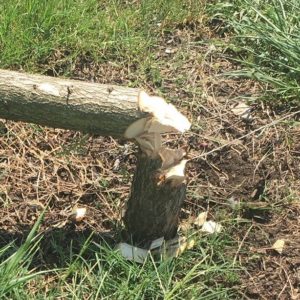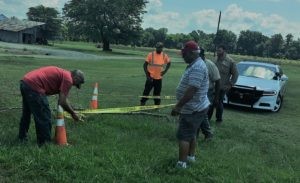An Arkansas judge and Baptist minister is asking that the chopping down of a tree planted in honor of victims of a 1919 race massacre be investigated as a hate crime.
 Mary Olson, president of the Elaine Legacy Center, reported Aug. 21 on Facebook that somebody chopped down The Living Memorial, a small willow tree planted last April to memorialize victims of the deadliest racial confrontation in Arkansas history.
Mary Olson, president of the Elaine Legacy Center, reported Aug. 21 on Facebook that somebody chopped down The Living Memorial, a small willow tree planted last April to memorialize victims of the deadliest racial confrontation in Arkansas history.
The act comes during controversy over the location of a new monument marking 100 years since the “Red Summer,” a wave of attacks across the country targeting African-Americans that ended with the massacre of more than 200 blacks in the rural area around Elaine.
Judge Wendell Griffen, pastor of New Millennial Church in Little Rock, says it should be investigated as a hate crime.
“What I’ve been hearing is, this is called an act of vandalism,” Griffen told WREG-TV in Memphis. “Let’s call it what it is, a hate crime.”
“Hacking down a tree is a hateful act,” Griffen said. “Hacking down a tree in memory of black people who have been massacred is a racially hateful act. This a racial hate crime. Call it the truth.”
In an opinion article published by Baptist News Global Aug. 22, Griffen criticized the dedication planned next month of the Elaine Massacre Memorial in Helena-West Helena, 25 miles from Elaine, near the courthouse where 12 black men were unfairly convicted of murder.
Griffen, who is African-American, said placing the monument in the county seat, not far from monuments honoring Confederate soldiers, is intended to line the pockets of the descendants of the white supremacists who caused the injustice rather than to honor the victims.
Kwami Abdul-Bey, also black and head of the rival Arkansas Peace & Justice Memorial Movement, says the monument is located in Helena because the county seat is better situated to attract and accommodate visitors.
USA Today reported Aug. 25 that local law enforcement said the felling of the tree and theft of its identifying tag is being handled by the state and that federal officials would not comment on whether a hate crime investigation is under way.
Meg Matthews, public information coordinator for Arkansas State Parks, said Aug. 27 the felling of the tree at Delta Heritage State Park is being investigated as a misdemeanor due to the $400 cost to replace it. Matthews said there are no suspects at this time and officials are waiting until the investigation by the chief ranger is complete to determine what will happen next.
A spokesperson for Gov. Asa Hutchison said the governor has been briefed about the case.

Officers treat felled memorial tree as a crime scene. (Facebook photo/Elaine Legacy Center)
On Sept. 30, 1919, tensions erupted in Elaine when African-American sharecroppers working on the plantations of white landowners gathered inside a church to unionize in an effort to get a fair price for their cotton crops.
A group of local white men showed up with weapons, shots were exchanged with black security guards, and a white security officer died.
Over the next four days an estimated 500 to 1,000 armed white people from Arkansas and Mississippi traveled to Elaine to quell what was being described as a “black insurrection.” Federal troops arrested hundreds of African-Americans and killed an unknown number.
By the time it was over, five white men were dead. Estimates of black deaths range from 100 to 237. The feds disarmed both sides and arrested 285 black residents rounded up in stockades until their employers would vouch for them.
After the violence, 12 black men who came to be called the Elaine 12 were convicted of murder by all-white juries and sentenced to death. Six of those convictions were overturned, and the rest were reversed by the Supreme Court decision in Moore v. Dempsey in 1923.
By a 6-2 majority, the Supreme Court ruled that the defendants’ mob-dominated trials violated the due process clause of the 14th Amendment. The landmark ruling set precedent that state courts cannot violate the federal constitutional, a major win for African-American civil rights.
Today Elaine is home to 636 residents and is 61 percent black. Locals say locating the massacre monument there would boost the economy. The Helena memorial is being paid for by David P. Solomon, a member of one of the city’s most prominent families, to, he says, promote peace between blacks and whites.
Related commentary:
This story was updated Aug. 27 with new information in the 11th paragraph.
